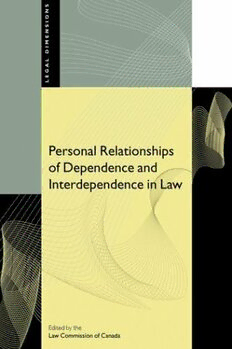Download Personal Relationships of Dependence and Interdependence in Law (Legal Dimensions Series) PDF Free - Full Version
Download Personal Relationships of Dependence and Interdependence in Law (Legal Dimensions Series) by Law Commission of Canada in PDF format completely FREE. No registration required, no payment needed. Get instant access to this valuable resource on PDFdrive.to!
About Personal Relationships of Dependence and Interdependence in Law (Legal Dimensions Series)
At their simplest level, human relationships are about ties between people. These ties, however, are anything but simple; rather, they are complex interdependencies whose dynamic reciprocity of obligations and interests is not always represented in our legal thinking. This collection explores the intersection of interdependency and the law, and contemplates some of the key issues at stake in the way the law interprets and addresses human relationships. Part of a series that questions fundamental concepts of law, this book looks critically at the legal concepts that have framed these relationships: contract, fiduciary duty, the "duty to act fairly," the impartiality of decision makers, and privileged communication. Many of these obscure the element of interdependency. The authors argue that interdependency is a fruitful critical - and human - framework by which to re-evaluate some of our traditional legal concepts. The book will be of interest to law and society scholars and students, as it presents a different critical framework through which to analyze traditional human relationships.
Detailed Information
| Author: | Law Commission of Canada |
|---|---|
| Publication Year: | 2002 |
| ISBN: | 9780774808859 |
| Pages: | 180 |
| Language: | English |
| File Size: | 0.512 |
| Format: | |
| Price: | FREE |
Safe & Secure Download - No registration required
Why Choose PDFdrive for Your Free Personal Relationships of Dependence and Interdependence in Law (Legal Dimensions Series) Download?
- 100% Free: No hidden fees or subscriptions required for one book every day.
- No Registration: Immediate access is available without creating accounts for one book every day.
- Safe and Secure: Clean downloads without malware or viruses
- Multiple Formats: PDF, MOBI, Mpub,... optimized for all devices
- Educational Resource: Supporting knowledge sharing and learning
Frequently Asked Questions
Is it really free to download Personal Relationships of Dependence and Interdependence in Law (Legal Dimensions Series) PDF?
Yes, on https://PDFdrive.to you can download Personal Relationships of Dependence and Interdependence in Law (Legal Dimensions Series) by Law Commission of Canada completely free. We don't require any payment, subscription, or registration to access this PDF file. For 3 books every day.
How can I read Personal Relationships of Dependence and Interdependence in Law (Legal Dimensions Series) on my mobile device?
After downloading Personal Relationships of Dependence and Interdependence in Law (Legal Dimensions Series) PDF, you can open it with any PDF reader app on your phone or tablet. We recommend using Adobe Acrobat Reader, Apple Books, or Google Play Books for the best reading experience.
Is this the full version of Personal Relationships of Dependence and Interdependence in Law (Legal Dimensions Series)?
Yes, this is the complete PDF version of Personal Relationships of Dependence and Interdependence in Law (Legal Dimensions Series) by Law Commission of Canada. You will be able to read the entire content as in the printed version without missing any pages.
Is it legal to download Personal Relationships of Dependence and Interdependence in Law (Legal Dimensions Series) PDF for free?
https://PDFdrive.to provides links to free educational resources available online. We do not store any files on our servers. Please be aware of copyright laws in your country before downloading.
The materials shared are intended for research, educational, and personal use in accordance with fair use principles.

